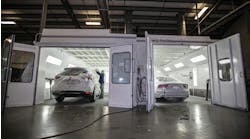When an MSO looks to expand, there are a number of possible strategies: acquiring an existing shop (or shops), building a brand new facility, or even setting up a franchise arrangement with an existing shop.
There is also brownfield development — converting an existing industrial facility into a body shop. These projects may involve rehabilitating a long-closed body shop or retrofitting a different type of building, like a warehouse, a mechanical shop or an industrial facility. In either case, brownfields can present some inherent advantages over new builds and acquisitions.
First, there can be a financial advantage to remodeling an existing building. "When you consider all the costs, they can be more expensive in the short term, but over time you are usually going to see a higher return on a brownfield than an acquisition," says John Walcher, president of Veritas Advisors. "You're not paying a premium for an existing shop's book of business or goodwill."
"Location, location, location is the first rule for any new shop," adds Gregg Murry, vice president of advertising and facilities at Service King. "But the main advantage [of a brownfield] is that you can convert the location faster than a new build. Most of the work, depending on the type of building, involves interior improvements."
Service King has taken a balanced approach to expansion, mixing acquisitions with new builds and brownfield development. Brownfield locations are usually developed to fill out coverage in an area where the company already has a substantial presence, usually through the acquisition of a local MSO.
Another benefit that brownfields share with new builds is that owners can establish the culture of the shop from day one. "When you're doing an acquisition, that's always a challenge, to integrate the culture and employees," Walcher says.
Brownfields do require a larger upfront investment to retrofit the building, remodel and install equipment. They also present a slower speed to market than acquiring an existing shop, although the time to market is faster than that of a greenfield development. "That's important for strategic reasons, if the opening is time sensitive," Walcher says.
While you do have to build the business from the ground up, "if you have the right platform, then you're just adding another store," says Jeff McFadden, president of Service King. "If you have the right carrier relationship, you can add a location and it's not that difficult to build up the business."
Owners should have plenty of working capital or cash available, because it will take time to open the shop, and time to build up a steady revenue source. "Owners often underestimate the time needed between opening the shop and achieving a steady level of revenue," Walcher says."
Due diligence required
The primary caveat with a brownfield location is that potential owners or lessees should perform a thorough due diligence on the site to determine what types of contaminants are present, and what types of businesses existed there in the past. The last thing a body shop needs is to be fined for someone else's toxic waste.
"That should also include both a phase one and phase two environmental analysis," Walcher says. "Phase one will hopefully identify the prior use of the property, which should give you some answers or indications as to where to take samples. Phase two will involve actual soil sampling."
"We do environmental investigations on every property, and if it has had a use that could cause problems, you have to benchmark the contaminant levels," Murry says. "What level of contamination did you have when you took it over? That way, you aren't responsible for somebody else's contamination."
Walcher also recommends researching fire department records, which can provide guidance as to where hazardous materials were stored on the property in the past. A trip to the city building or planning department will also provide insight into zoning restrictions and required use permits/licenses. "In states where there is an air quality board or a bureau of automotive repair, check with those agencies to find out the status of the last license or permit applicable to that property to ensure a future business will be permitted," Walcher says. In some areas, it can be harder to get a shop licensed and permitted if the property has been idle, compared to acquiring an operating shop.
Zoning is another issue that shop owners should investigate when looking at brownfield redevelopment. Just because a property previously served as an industrial or commercial site doesn't mean that you will experience smooth sailing with the zoning/permitting board.
The high visibility locations most attractive for a potential new shop can present a zoning challenge, particularly in more affluent communities. "You're looking for a location that is near a lot of density of rooftops and people that own cars," Murry says. "If you are looking to be an operator in a high visibility area, you are going to deal with some level of zoning issues.
One way to get cooperation from the city is to present a detailed plan, showing the zoning board or city council that the facility will be attractive, and that vehicles won't be stored haphazardly on the property. The required improvements will also impact the profitability of the site.
"You have to look at the property and evaluate the rent factor in relationship to its operational expenses," Murry says. "Is this an allowable use within the city zoning ordinances? What investment do you have to make on top of the rent if the landlord won't front expenses to convert the facility? Those are really the two major factors: cost of improvements and zoning compliance."
And while some states and municipalities have established grants and programs to assist with the rehabilitation of vacant industrial sites, don't expect a body shop to receive any of them. "Some cities would rather not have body shops in them, and there's a limited amount of land allocated for that use," Walcher says. "There's still more a trend toward limiting body shops, rather than encouraging them to rehabilitate blighted areas."
There are communities where brownfield development may be eligible for special tax breaks, incentives and waivers, or that might qualify for consideration by the state or federal environmental agencies. Again, though, body shops tend to get short shrift because they aren't considered desirable businesses. It's up to the shop owner to convince the community that the shop will benefit the area, can be visually appealing in a high-profile location, and won't contribute substantively to pollution concerns.
"As much as cities want good development, I'm not sure they always have the opinion that the best use is a body shop," Murry says. "That's still a challenge, and it's based on perceptions about our industry that just aren't true anymore. But if it's not a residential area, you can show that you will develop a retail-style storefront and manage the vehicle storage in a way that is amenable to the community, you will get cooperation."




